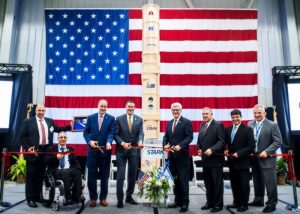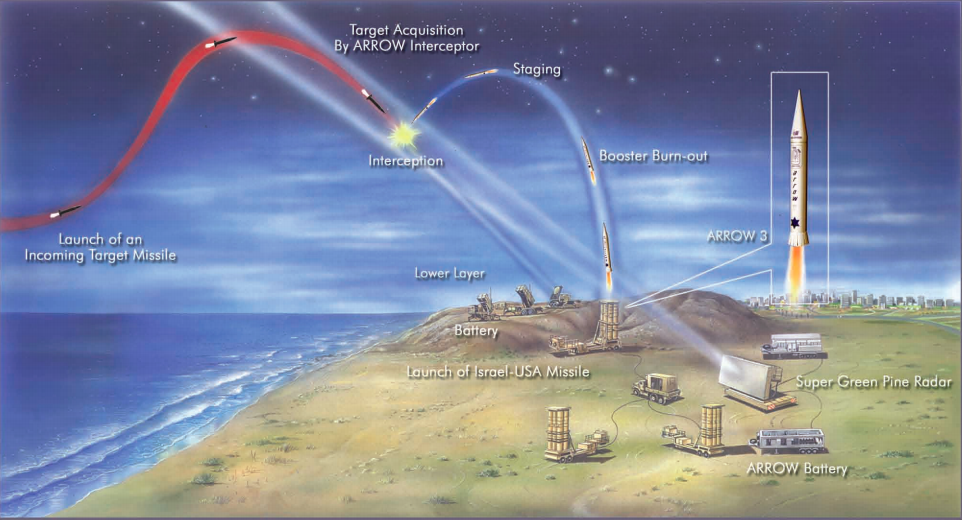ΣΧΟΛΙΟ ΙΣΤΟΛΟΓΙΟΥ : Αυτό το άρθρο μου φέρνει στο νου το σχόλιο που είχαμε κάνει εδώ ..." Το Ισραήλ λόγω
του μικρού γεωγραφικού του αποτυπώματος του στη Μέση Ανατολή και των βραχυπρόθεσμων
πολεμικών πόρων του, δεν θα μπορέσει να πολεμήσει σε έναν μακροχρόνιο
παρατεταμένο πόλεμο για περισσότερο από 4-6 εβδομάδες, το ξέρουμε αυτό
από προηγούμενους πολέμους. Εάν
υπάρχει άμεση απειλή για τα σύνορά του και θεωρεί ότι θα χάσει σε έναν
συμβατικό πόλεμο, το Ισραήλ ως έσχατη λύση, θα χρησιμοποιήσει πυρηνικά,
γι 'αυτό η Μέση Ανατολή είναι ένα τόσο επικίνδυνο μέρος για την έναρξη
ενός παγκόσμιου πυρηνικού πολέμου.Για
αυτό το Ισραήλ θέλει να έχει Κύπρο-Κρήτη και Θεσσαλονίκη σαν μια
ΔΕΥΤΕΡΗ ΠΑΤΡΙΔΑ σε περίπτωση που η σημερινή γεωγραφική τους πατρίδα (και
σχετικά πρόσφατη) γίνει για αυτούς μια ΚΟΛΑΣΗ. "
Ελπίζουμε να μην καταλήξει και αυτό το σύστημα "μυστηριωδώς" στα χέρια των Κινέζων.!! Διότι έχουν υπάρξει φωνές μέσα απο το Ισραήλ που μιλάνε για μεταφορά τεχνολογίας από το Ισραήλ στην Κίνα.
TEL AVIV: Complex export rules make it much easier to sell a high-tech weapons system labeled “Made In The USA” than one marked “Made In Israel.” So it’s significant that last week, the US subsidiary of Israel Aerospace Industries (IAI), Mississippi-based Stark Aerospace, ceremoniously delivered the first US-built canister for IAI’s Arrow-3 missile defense interceptor.
While IAI and Stark, and Boeing – also deeply involved in the Arrow – didn’t point this out publicly, a source close to the Arrow program told me that producing such key components in the US could make it possible to export the system worldwide.
Arie Herzog, former head of Israel’s missile defense directorate, agreed: “The transfer of production of the system’s components to the US will, without any doubt, make it easier to offer the Arrow to the countries that want it. This will be a complicated process, but a door was certainly opened last week.”

Japan, South Korea,
and other countries have already shown great interest in the Arrow
system. But US involvement in this program prevented even preliminary
discussions about an export deal. Why? Because when the US helps fund
development of an Israeli weapons system, it gets a veto over any
exports of that system – a veto which Washington uses to prevent Israeli
competition with US products in the global market.
What’s more, the US is imposing new restrictions on its defense grants
to Israel, which Tel Aviv traditionally converts in large part from US
dollars to Israeli shekels so it can pay Israeli companies. The new
rules steadily reduce the amount of aid Israel can convert this way,
ultimately cutting it to zero – which means all the aid has to be spent
in dollars. That will affect $500 million a year in US Foreign Military
Funding (FMF) grants for Israeli missile defense programs alone.
So IAI, like many other Israeli companies, is reacting by turning to US affiliates, subcontractors, and partners. And spending the money back in the US not only helps IAI comply with the new rules, it builds a domestic US constituency for the program. Attending last week’s delivery ceremony at Stark, along with officials of the Israeli Ministry of Defense, were Mississippi Governor Phil Bryant and several members of Mississippi’s congressional delegation.
IAI, Arrow, & Boeing
IAI is the prime contractor for the Arrow Weapons System, the upper tier of Israel’s multi-layered missile defense. Arrow defends against ballistic missiles; David’s Sling is the middle tier, defending against cruise missiles, some ballistic missiles, and larger rockets; and the famed Iron Dome is the lower tier, defending against relatively short-ranged artillery rockets. Indeed, Israeli proudly call this combination the world’s first truly national missile defense system, noting that America’s Ground-Based Midcourse Defense (GMD) doesn’t cover the entire US.
ississippi’s Stark builds the canister for the Arrow-3,
which engages incoming missiles at very long range and very high
altitude, outside the atmosphere. IAI also builds the complementary Arrow-2, an earlier model that takes on lower-altitude threats.
Boeing has been deeply involved in the Arrow program for years, providing components for the Arrow-2 and co-developing and co-producing the Arrow-3.
In 2014, Boeing missile experts were present in the IAF’s Palmachim airbase, where the second successful flight test of the Arrow-3 missile was conducted jointly by the Israel Ministry of Defense and the US Missile Defense Agency. The system passed its first full interception test over the Mediterranean sea in 2015 and was deployed in Israel in 2017.
A live intercept test in Alaska was planned for 2018, but it was postponed “to improve the system’s readiness,” the Israeli Defense Ministry said. No new date was given. But sources told me that the Alaska test is still in the works, and it will evaluate some significant advancements to the Arrow-3 to better defend against “new, evolving” threats.
ΠΗΓΗ
Ελπίζουμε να μην καταλήξει και αυτό το σύστημα "μυστηριωδώς" στα χέρια των Κινέζων.!! Διότι έχουν υπάρξει φωνές μέσα απο το Ισραήλ που μιλάνε για μεταφορά τεχνολογίας από το Ισραήλ στην Κίνα.
TEL AVIV: Complex export rules make it much easier to sell a high-tech weapons system labeled “Made In The USA” than one marked “Made In Israel.” So it’s significant that last week, the US subsidiary of Israel Aerospace Industries (IAI), Mississippi-based Stark Aerospace, ceremoniously delivered the first US-built canister for IAI’s Arrow-3 missile defense interceptor.
While IAI and Stark, and Boeing – also deeply involved in the Arrow – didn’t point this out publicly, a source close to the Arrow program told me that producing such key components in the US could make it possible to export the system worldwide.
Arie Herzog, former head of Israel’s missile defense directorate, agreed: “The transfer of production of the system’s components to the US will, without any doubt, make it easier to offer the Arrow to the countries that want it. This will be a complicated process, but a door was certainly opened last week.”

US
and Israeli dignitaries celebrate the first Arrow-3 missile canister
delivered by IAI’s US subsidiary, Mississippi-based Stark Aerospace.
So IAI, like many other Israeli companies, is reacting by turning to US affiliates, subcontractors, and partners. And spending the money back in the US not only helps IAI comply with the new rules, it builds a domestic US constituency for the program. Attending last week’s delivery ceremony at Stark, along with officials of the Israeli Ministry of Defense, were Mississippi Governor Phil Bryant and several members of Mississippi’s congressional delegation.
IAI is the prime contractor for the Arrow Weapons System, the upper tier of Israel’s multi-layered missile defense. Arrow defends against ballistic missiles; David’s Sling is the middle tier, defending against cruise missiles, some ballistic missiles, and larger rockets; and the famed Iron Dome is the lower tier, defending against relatively short-ranged artillery rockets. Indeed, Israeli proudly call this combination the world’s first truly national missile defense system, noting that America’s Ground-Based Midcourse Defense (GMD) doesn’t cover the entire US.
Boeing has been deeply involved in the Arrow program for years, providing components for the Arrow-2 and co-developing and co-producing the Arrow-3.
A live intercept test in Alaska was planned for 2018, but it was postponed “to improve the system’s readiness,” the Israeli Defense Ministry said. No new date was given. But sources told me that the Alaska test is still in the works, and it will evaluate some significant advancements to the Arrow-3 to better defend against “new, evolving” threats.
ΠΗΓΗ

Δεν υπάρχουν σχόλια:
Δημοσίευση σχολίου